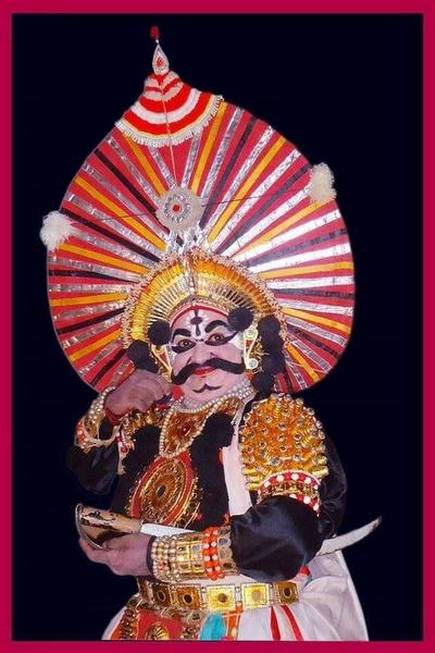Yakshagana | 06 Jan 2021
Why in News
Recently a Yakshagana artiste died while performing on stage.
Key Points
- Yakshagana is a traditional theatre form of Karnataka.
- It is a temple art form that depicts mythological stories and Puranas.
- It is performed with massive headgears, elaborate facial make-up and vibrant costumes and ornaments.
- Usually recited in Kannada, it is also performed in Malayalam as well as Tulu (the dialect of south Karnataka).
Note:
- Tulu is a Dravidian language whose speakers are concentrated in the region of Tulu Nadu, which comprises the districts of Dakshina Kannada and Udupi in Karnataka and the northern part of Kasaragod district of Kerala.
- The oldest available inscriptions in Tulu are from the period between 14th to 15th century AD.
- It is performed with percussion instruments like chenda, maddalam, jagatta or chengila (cymbals) and chakratala or elathalam (small cymbals).
- The most popular episodes are from the Mahabharata i.e. Draupadi swayamvar, Subhadra vivah, etc. and from Ramayana i.e. Rajyabhishek, Lav-Kush yuddh, etc.
| Theatre Forms | State | Theme |
| Nautanki | Uttar Pradesh | Often draws on romantic Persian literature for its themes. |
| Tamasha | Maharashtra | Evolved from the folk forms such as gondhal, jagran and kirtan. |
| Bhavai | Gujarat | Subtle social criticism laced with humour. |
| Jatra | West Bengal/Orissa and eastern Bihar | Originated in Bengal as a result of the Bhakti movement. Initially known as Krishna jatra due to Chaitanya’s (spiritual founder of Gaudiya Vaishnavism) influence. |
| Koodiyattam | Kerala | Oldest traditional theatre forms of India, it follows the performative principles of the ancient tradition of Sanskrit theatre. In 2001, Koodiyattam was officially recognized by UNESCO as a Masterpiece of the Oral and Intangible Heritage of Humanity. |
|
Mudiyettu |
Kerala | Traditional ritual theatre and folk dance drama from Kerala that enacts the mythological tale of a battle between the goddess Kali and the demon Darika. The ritual is a part of the bhagavathi or bhadrakali cult. |
| Bhaona | Assam | A creation of Srimanta Sankardeva (an Assamese saint-scholar), these plays were written in Brajavali, a unique Assamese-Maithili mixed language, and are primarily centered on Hindu deity, Krishna. |
| Maach | Madhya Pradesh | It is a sung folk theatre that has a semi sacred character, blending religious and secular themes. |
| Bhand Pather | Kashmir | Satire, wit and parody are commonly used in this folk drama that incorporates local mythological legends and contemporary social commentary. |

